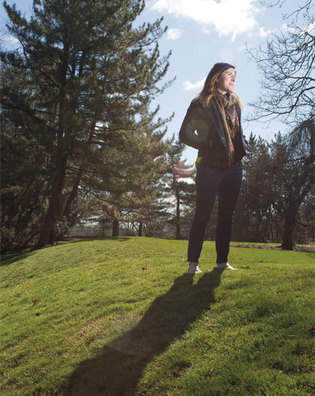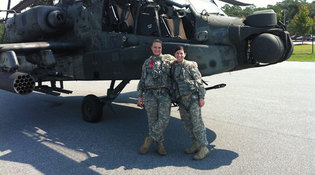 loading
loading
War and after Mark OstowView full image Courtesy Elizabeth VerardoElizabeth Verardo ’16MA (right in photo, this page), shown here at a 2011 training flight in Hilton Head Island with fellow avaiation officer Cassie Wyllie, commanded a company of Apache helicopters in Afghanistan before coming to study at Yale’s Jackson Institute. View full imageMaster’s studentElizabeth Verardo ’16MA, second-year master’s student in global affairs, Jackson Institute at Yale. Age: 31. Army, 2007 to present. Deployed to Afghanistan in November One evening in January 2014, Army captain Elizabeth Verardo ’16MA found herself in Kyrgyzstan, anxiously trying to upload her application to the global affairs program at Yale’s Jackson Institute. “I was kicking myself for waiting till the last minute,” says Verardo. It was within a week or two of the due date, but she was en route to Afghanistan as commander of an attack aviation company with 33 soldiers and 11 Apache helicopters. A few months later, Verardo was in her office in Jalalabad looking over the coming week’s flight schedule when an e-mail caught her eye. After a moment of incredulity, she turned to one of her platoon leaders, who happened to be in the office. “You will never believe who just e-mailed me,” she told him. The message was from retired general Stanley McChrystal, who teaches at the Jackson Institute. He told her why she should come to Yale, Verardo recalls, and offered to answer any questions she might have. “And he signs it ‘Stan.’ A retired four-star, e-mailing this lowly captain.” As a graduate student, Verardo says, she has acquired the broad perspective and the vocabulary to evaluate the fit between strategic objectives and what actually happens on the ground. One memorable class was US Foreign Policy and the Law, taught by Jake Sullivan ’98, ’03JD, Vice President Biden’s former national security adviser. “We tend to have these very idealistic approaches to foreign policy, based solely on American values,” says Verardo, “but the story is often much more complicated. This gave me the ability to see the churn of national government—how do they evaluate a situation, and develop policies, and then correct course when something doesn’t work?” In McChrystal’s class on leadership, Verardo wrote reflections on her own successes and failures. “Being at Yale is a pause, and it’s also getting me ready for the next assignment.” During the summer after her first year, she immersed herself in two unfamiliar cultures. One was in rural Kenya, where she worked with Eddy Oketch ’16MA at his nonprofit, which helps young people run small businesses. The other: the State Department in Washington, DC. In each place, she had to get accustomed to a new language. Whereas “DoD [the Department of Defense] is very direct, and there’s an economy of language that goes with it,” she says, “the State Department is very flowery with their language and effusive in their praise.” Verardo tells a story about initiation into Army life. In her third week of basic training at West Point, the squad leader gave everyone exactly two minutes to get magazines from their rooms. Verardo raced up six flights, dumped out her gear duffle on the bed, and hunted for magazines. “He said ‘magazine,’ and I’m thinking Guns and Ammo, Better Homes and Gardens. I had no idea that ‘magazine’ had an alternate definition”—a spring-loaded chamber that feeds bullets into a firearm. A classmate found her frantically searching. “They’re right in front of your face,” he said, pointing at the six magazines on the bed. “He was ‘prior service,’” says Verardo, “so in our minds he was a god.” After Yale graduation in May, Verardo will return to West Point to teach. “There is no free lunch,” she notes. For her two years at Yale, she will owe six years of service. This doesn’t faze Verardo. She wants to be career Army.
|
|